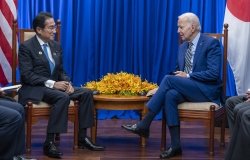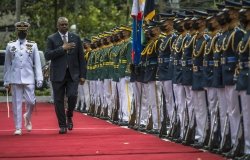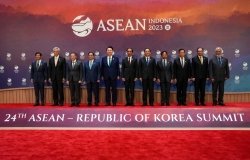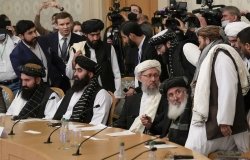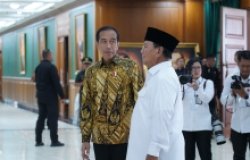
A blog of the Indo-Pacific Program
Calming the Neighborhood: Pakistan’s Immediate Security Challenges Post-Election
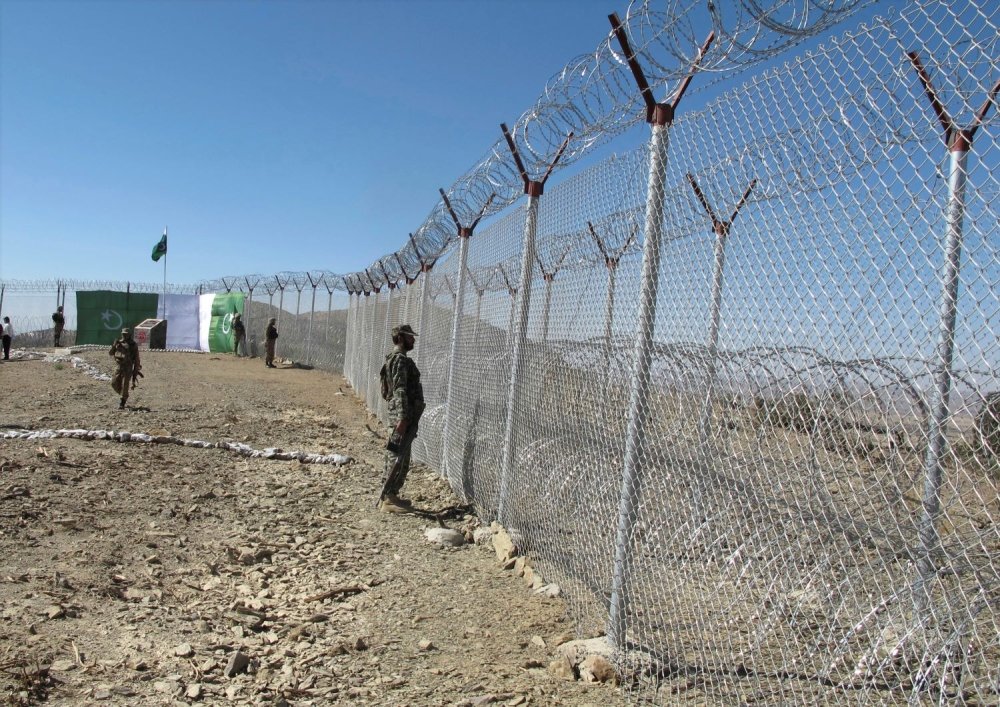
In the wake of a highly controversial election, Pakistan under its new coalition government is beset by a complex array of internal challenges. These include navigating a spiraling economic crisis, overcoming ongoing political instability, and restoring public confidence in its civilian and military institutions, which have been significantly undermined by accusations of misconduct both before and during the election. On top of all these serious domestic issues, the incoming government has inherited a volatile regional landscape, requiring its immediate foreign policy attention. Except for its iron-clad relationship with China, Pakistan finds itself facing potential challenges from all its other neighbors - Afghanistan, Iran, and India. Interestingly, however, in a departure from historical precedent, its antagonistic eastern neighbor, India, might not be its most immediate concern, as its western borderlands with Iran and Afghanistan continue to see more significant tensions this year.
Afghanistan
Despite offering the Taliban tacit support for most of its existence, Pakistan’s relationship with the Taliban has nose-dived since the group took power in Afghanistan. Pakistan has witnessed a surge in terrorism for the third consecutive year, with an uptick recorded each year since the Taliban’s takeover in 2021, as indicated in a recent report. The report states that in 2023, Pakistan witnessed almost 3000 casualties from 789 terror-related incidents, marking a six-year high. Over 90% of the fatalities and 84% of the terror attacks were recorded in the two provinces which border Afghanistan, Balochistan and Khyber Pakhtunkhwa. Most of these attacks were carried out by Tehreek-e-Taliban Pakistan (TTP) and Baloch militant groups, all of whom officials in Islamabad vehemently argue operate from Afghanistan. Pakistani officials have stated that the TTP live and operate under Taliban control and are “allowed to cross the Pakistan border, sabotage activities, massacre and then go back”
Due to this surge, Pakistan’s “supportive policy” towards the Afghan Taliban has significantly shifted to one of hostility and pressure. Pakistan’s new policy of pressure has operated on three levels:
- Diplomatic Leverage: In November of the previous year, Pakistan decided not to continue advocating for the Taliban’s case at the international level, which it had been doing since 2021, urging for international engagement with their regime. It had also worked with regional powers to push for lifting of sanctions on the Taliban and access to their funds frozen by the US.
- Economic Constraints: Pakistan has notably tightened restrictions on Afghan trade and linked the easing of these measures to concrete anti-TTP steps taken by Kabul.
- Using Afghan Nationals: A particularly stark measure has been Pakistan’s dramatic decision to expel almost 1.7 million undocumented Afghan migrants in response to Taliban’s non-cooperation to act against militants, as admitted by the caretaker Pakistani PM. This decision was made in the face of significant international criticism, with concerns raised that such actions could trigger a human rights catastrophe. A second wave of Afghan migrant expulsions has also recently been announced to commence in less than a month.
Military Dimension: While Pakistan had largely refrained in the last few years from incorporating a military dimension into its pressure tactics against the Taliban—aside from one incident in 2022—the recently conducted cross-border air strikes into Afghanistan show that is no longer the case. The military option for targeting “militant sanctuaries” inside Afghan territory will be used on a more frequent basis than before. This option will likely only be used in response to high-level attacks on security forces such as recent incident in North Waziristan, which killed seven security personnel, including two officers, and prompted the military strikes.
For their part, the Taliban have similarly escalated hostility towards Pakistan, through increasingly hostile statements and their unwillingness to budge on the TTP issue. The Taliban have consistently denied Pakistan's allegations regarding the presence of TTP fighters, dismissing them as Pakistan's internal matter, a stance maintained despite evidence from a recent UN report. The entire Taliban leadership have also openly expressed their discontent with Pakistan’s decision to expel Afghans, openly warning of consequences for this move. One of the Taliban leaders voicing this criticism is acting interior minister Sirajuddin Haqqani, once seen as a close ally of Pakistan's intelligence services. More recently, the deputy foreign minister, Sher Mohammad Abbas Stanikzai, seemed to re-ignite tensions around the contentious Durand Line. He refuted Islamabad’s assertions that it serves as the international boundary, instead calling it an “imaginary line.” He further said that “we have never recognized Durand and will never recognize it, today half of Afghanistan is separated and is on the other side of the Durand Line,” in essence, re-stating irredentist claims to a significant portion of Pakistani territory.
Pakistan’s pressure campaign will unlikely yield any substantial shift in the group's policies...
The recent air strike by Pakistan even prompted the Taliban’s security forces to target Pakistani military installations on the border in retaliation, along with issuing hostile statements saying that its forces are ready to respond to all aggressive actions by Pakistan.
Pakistan’s pressure campaign will unlikely yield any substantial shift in the group's policies, as evidenced by the Taliban's steadfast reluctance to modify their stance on women's education despite considerable regional and international pressure. This intransigence is rooted in the decision-making power being centralized in Kandahar, the Taliban's spiritual capital, under the authority of the supreme leader, Haibatullah Akhundzada, and his close circle of ideologues. The ideological convictions held in Kandahar preclude any significant compromise on the Afghan Taliban's ideological and fraternal ties with the TTP, who’ve pledged their allegiance to the supreme leader. Additionally, the increasing use of the military option will only strengthen the hardliners within the Taliban and prompt them to possibly provide more support to the TTP to get back at Pakistan. Therefore, the Taliban simply handing over the entire TTP leadership operating from Afghanistan due to this pressure campaign seems deeply unlikely. However, the Taliban have the ability to influence TTP’s actions to a significant level.
IRAN
The Iran-Pakistan relationship, historically warm, has evolved into a complex dynamic, particularly after Iran's 1979 Revolution. While both nations continue to emphasize their shared cultural and religious ties, their interactions are increasingly defined by strategic interests, shaped significantly by the influential roles of Iran's elite IRGC force and Pakistan's military in their respective foreign policies. The post-revolution period saw complicated relations due to sectarian divides in the 1980s and differing alignments with global and regional powers, including the US, Saudi Arabia, and India. Earlier this year, this delicate relationship was suddenly plunged into deep crisis following a series of cross-border military engagements initiated by the IRGC as it launched cross-border strikes into Pakistan’s Balochistan province. Iran targeted what it labeled as “bases” of Jaish al-Adl, a group it deems a terrorist organization. Iran’s strikes prompted a strong condemnation from Pakistan and led to the downgrading of diplomatic ties. Pakistan further retaliated by conducting its own strikes in Iran’s Sistan-Baluchistan province, targeting “hideouts” used by Baloch militant groups. This was the first airstrike by any country’s warplanes on Iranian soil since the 1980s.
In a remarkable turn of events, these heightened tensions were swiftly de-escalated through robust bilateral mechanisms, restoring diplomatic ties. The prevailing conditions of both countries significantly influenced this decision as neither could afford further escalation. The prompt visit of the Iranian foreign minister, Hossein Amir-Abdollahian to Islamabad also played a pivotal role in mending strained relations. During his meetings with Pakistan’s interim leadership and army chief, General Asim Munir, the focus was on reinforcing “brotherly ties” and the necessity of dialogue and cooperation.
Both neighboring states harbor suspicions that the other shelters these militant groups or, at the very least, exhibits a lack of initiative in dismantling their safe havens within their respective borders.
Despite the relative cool-down in tensions, the root cause of this crisis remains: cross-border militancy by violent groups operating in the Balochistan region that straddles the two nations. The low-level insurgencies in Pakistan's Balochistan and Iran's Sistan-Baluchistan, with differing ideologies—Sunni Islamist in Iran and secular nationalist in Pakistan—have led to severe security challenges. Groups like Jaish al-Adl in Iran and the Balochistan Liberation Army in Pakistan have been involved in numerous attacks along the border. Both neighboring states harbor suspicions that the other shelters these militant groups or, at the very least, exhibits a lack of initiative in dismantling their safe havens within their respective borders. Cross-border militancy has repeatedly been a flashpoint, leading to crises between these neighboring states. High-profile incidents, including attacks on security personnel and accusations from Iran's IRGC against Pakistan's intelligence services, underscore the ongoing security dilemma.
The recent Pakistan-Iran border crisis has further eroded trust in this delicate relationship. The threat of cross-border militancy will constantly overshadow any progress made in the relationship and will continue to breed mistrust between these two turbulent neighbors.
Policy Recommendations for Mitigating Security Threats
Afghanistan
International Consensus: Pakistan should strive to reinforce the precarious international consensus on a unified approach to the Taliban. It can do this by bridging coordination on Afghanistan between the UN-led initiatives such as the recent Doha meeting and regional forums such as the Moscow Forum Consultations. A unified stance that holds the Taliban to its counterterrorism commitments is crucial. This approach will provide Pakistan with significant international backing in its dealings with the Taliban.
Engaging constructively with the Taliban: On a bilateral level, Pakistan should constructively engage in dialogue with the Taliban to its benefit. Firstly, the counterproductive elements of its pressure campaign, which creates needless bitterness between the two countries and incurs significant international criticism, must be revisited. This primarily refers to reevaluating its decision to using the military option and expelling 1.7 million Afghans. If policymakers are unwilling to halt the expulsion, then at the very least, it must align the repatriation of undocumented Afghan migrants with relevant humanitarian norms.
Strategic Diplomatic Focus: The focus of diplomatic overtures should be on swaying Kandahar, along with the Taliban in Kabul. In this new focus, the role of key civilian and military actors who have historical ties with the Taliban becomes crucial. Maulana Fazlur Rehman, a prominent political leader with ideological connections to the Taliban, recently made a visit to Afghanistan and was accorded considerable significance by the Taliban, marking the second known meeting between a foreign official and the Taliban's reclusive supreme leader in Kandahar. Maulana’s visit underscores the importance of utilizing established, cordial relationships between Pakistan’s civilian and military personnel and the Taliban.
Managing Direct Talks with the TTP: Should the Taliban be persuaded, they will likely advocate for direct TTP-Pakistan talks. However, Pakistan should defer such negotiations until it secures a significant strategic advantage over the TTP. Engaging in talks without a position of strength could inadvertently provide the group with legitimacy and breathing space. Until then, it must utilize the Taliban as an intermediary to control, restrict, and indirectly talk with the TTP (that is, act as a go-between between Pakistan and the TTP).
Strengthening Domestic Counter-TTP Measures: Pakistan needs to intensify its domestic campaign against the TTP, incorporating a political dimension alongside military efforts. An ideological response is essential to counter TTP's propaganda, which has grown increasingly political and tech-savvy. It's critical to develop a broad consensus on a National Action Plan 2.0, which adapts to evolving circumstances, proactively addresses local grievances in the former tribal areas, rebuilds confidence of the tribal region's populace in the state, and fosters public buy-in for any military operation that the Pakistani armed forces concurrently undertake to eradicate the growing TTP threat in Pakistan.
Iran
Maximizing Existing Mechanisms: The recent crisis underscored the value of established bilateral mechanisms between the two countries. Moving forward, these mechanisms should not only serve as tools for conflict resolution but must also be utilized as regular platforms to diffuse the growing distrust within the relationship. The recent introduction of a high-level dialogue mechanism, specifically designed for regular meetings at the foreign ministers' level, is a significant step forward.
Joint Counterterrorism Initiatives: Given the persistent threat posed by cross-border militancy, Iran and Pakistan must prioritize joint counterterrorism efforts. This includes shared intelligence operations, coordinated strikes against militant hideouts, and a unified strategy to dismantle the financial and logistical networks supporting these groups. The recent agreement between the Iranian foreign minister and General Munir to activate a network of military liaison officers is a step in the right direction, as it will facilitate better coordination and boost response coordination.
Border Security and Management: The porous nature of the Iran-Pakistan border remains a major problem. Enhancing border security through technological upgrades, including surveillance and monitoring systems, can help prevent unauthorized crossings and militant infiltration. The 2019 decision to form a joint border response force must be significantly enhanced and utilized effectively to combat militant threats.
Addressing Root Causes of Militancy: Both nations should work together on socio-economic initiatives aimed at addressing the underlying causes of insurgency in the Balochistan region. This includes investment in development projects, education, and job creation, which can help soften the grievances exploited by militant groups to recruit and operate.
Conclusion
Pakistan faces immediate security threats in its neighborhood, specifically a compounding cross-border militancy threat which contributes to its deteriorating relations with both Iran and Afghanistan. The security dynamics with Afghanistan have deteriorated significantly following the return to power of the Taliban, which has emboldened militant groups like the TTP, leading to an alarming surge in cross-border terrorism. This resurgence of militancy not only strains Pakistan's relationship with the Taliban but also signals a broader regional security concern that requires urgent attention. Similarly, relations with Iran are tested by the persistent issue of cross-border militancy, underscoring a complex security dilemma that both nations struggle to address. These challenges highlight the critical need for Pakistan to prioritize efforts to reduce cross-border militancy within its foreign policy agenda.
Recognizing the gravity of these security concerns, the Foreign Office has reportedly prepared a set of recommendations for the new government. One can only hope that these recommendations include a multi-pronged strategy that emphasizes diplomatic engagement, regional cooperation, and internal consolidation (that is, a set of internal measures including domestic counterterrorism operations against TTP, border security, addressing the root causes of militancy, etc.) Enhancing existing bilateral mechanisms, fostering constructive dialogue with both the Taliban and Iran, and concurrently addressing the root causes of militancy through promoting more socioeconomic development and political inclusivity could serve as foundational steps toward mitigating immediate threats and building a framework for long-term stability.
These steps will be crucial in securing not only Pakistan's borders but also its future as a stable state. This forward-looking approach, blending strategic diplomacy with comprehensive internal security measures, offers a roadmap for Pakistan to safeguard its interests, navigate the complexities of its immediate foreign policy challenges, and contribute to a sense of calm in its volatile neighborhood.
Follow the Indo-Pacific Program on X @WC_IndoPacific. or join us on Facebook.
The views expressed are the author's alone, and do not represent the views of the U.S. Government or the Wilson Center. Copyright 2024, Asia Program. All rights reserved.
About the Author
Makhdum Karam Shah

Indo-Pacific Program
The Indo-Pacific Program promotes policy debate and intellectual discussions on US interests in the Asia-Pacific as well as political, economic, security, and social issues relating to the world’s most populous and economically dynamic region. Read more



